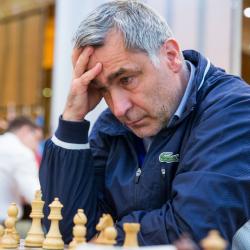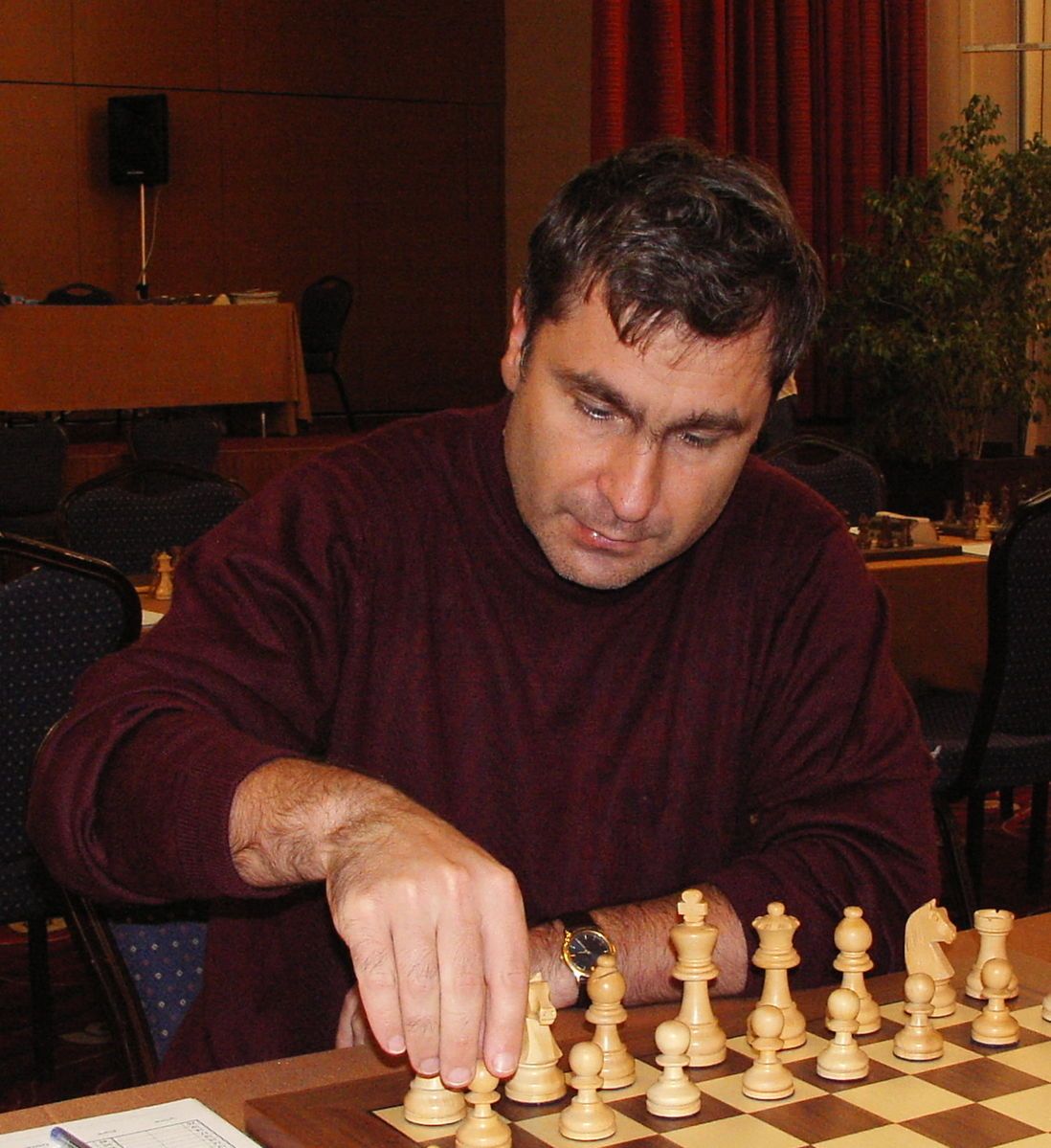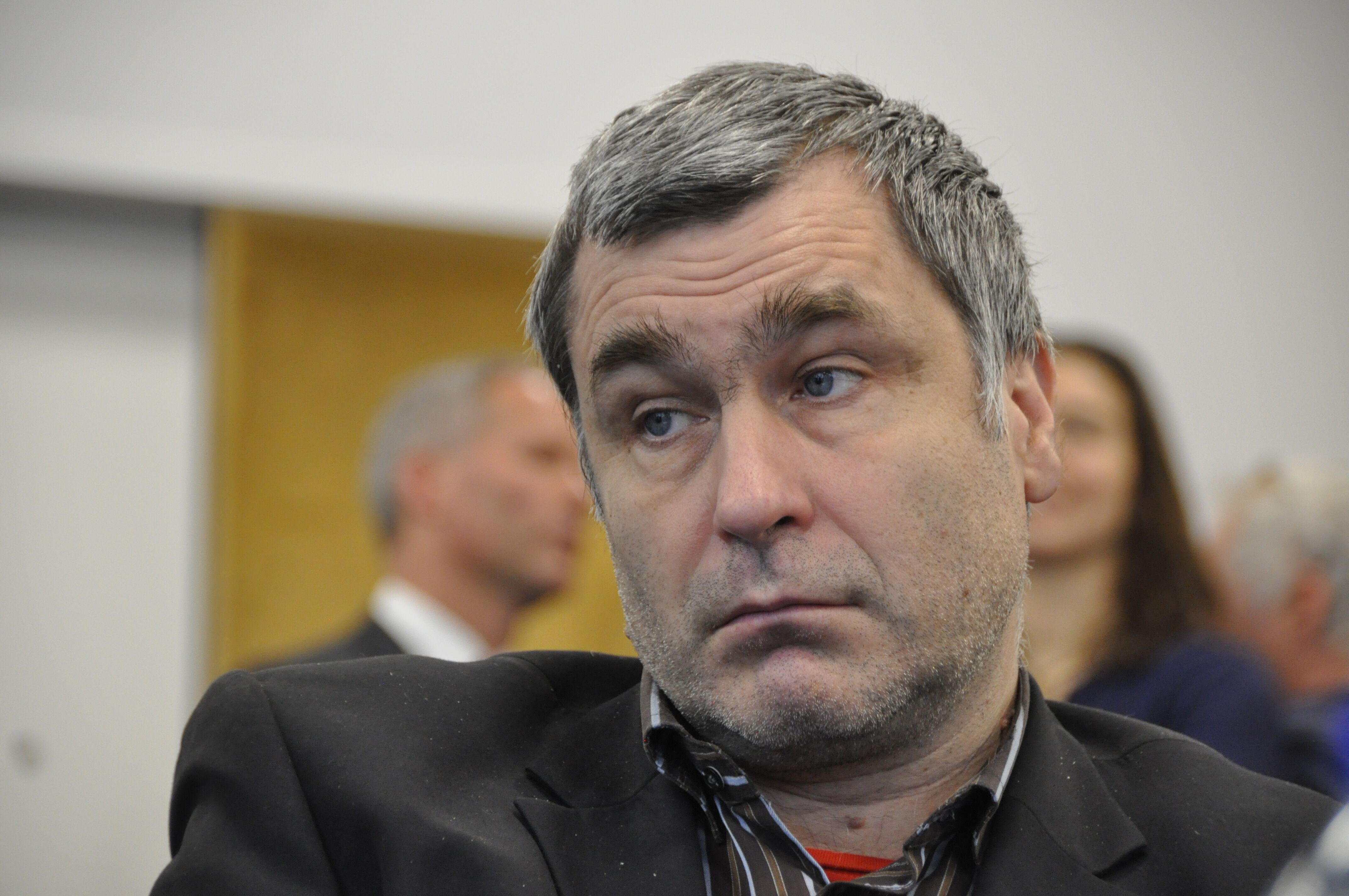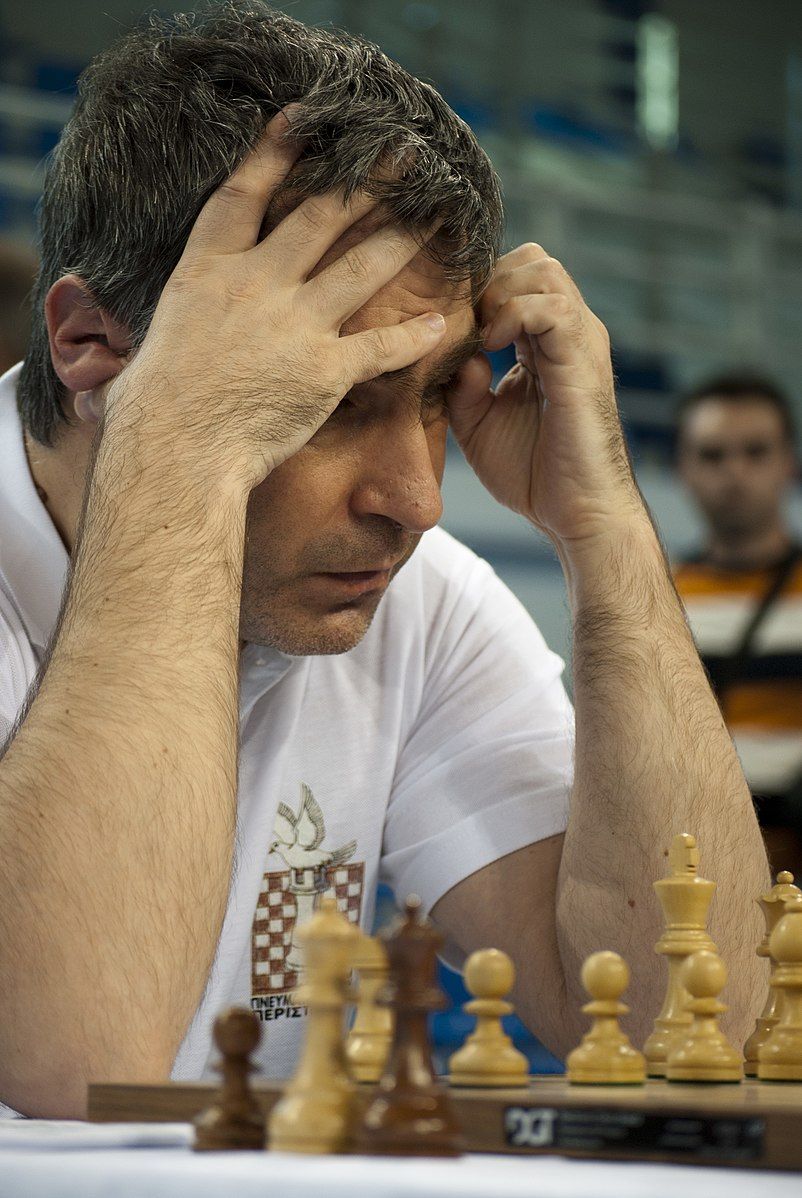GM Vasyl Ivanchuk

Bio
Vasyl Ivanchuk is a Ukrainian grandmaster and world-class player. He was the number-two player in the world on three separate occasions (1991, 1992 and 2007) and made it to the 2002 FIDE World Championship Finals. He has won many international tournaments, including the Tal Memorial, Linares, Biel, Gibraltar Masters, the M-Tel Masters.
Ivanchuk won the 2004 European Individual Championship, the 2007 World Blitz Championship, and the 2016 World Rapid Championship. He has defeated every Classical and FIDE World Champion after GM Bobby Fischer—from GM Anatoly Karpov through reigning World Champion GM Magnus Carlsen.
- Style
- Early Career
- World-Class Player
- World Championship Candidate
- 2002 FIDE World Championship
- 2013 Candidates Tournament
- Recent Events
Style
Nicknamed "Chuky," Ivanchuk has one of the most creative and unpredictable styles of play in recent history. He has a unique universal style, where he can do everything extremely well but also has a specific clarity for imaginative play and unexpected sacrifices. He seems to have a proclivity for playing in positions with material imbalances.
In the following game against the tactical wizard, GM Alexei Shirov, we see some of Ivanchuk's creativity and brilliance. After 20 moves of theory in a sharp line of the Slav Defense, Ivanchuk broke out a new move and interesting queen sacrifice with 21. Qg7?!
After this unexpected sacrifice, the position is entirely unclear and messy—the type of position where Shirov thrives. However, it was Ivanchuk who plays the materially imbalanced position more precisely. By move 30 it is clear that Ivanchuk's active rooks and knight are overpowering Shirov's queen and rook. A few moves later, Shirov resigns in a lost heavy-piece endgame.
Early Career
In 1987 Ivanchuk won the European Junior Chess Championship and became an international master. In 1988 he electrified the chess world by winning the New York Open ahead of many top grandmasters and tied for first at the 1988 World Junior Championship (with GM Joel Lautier who won on tiebreaks).
Ivanchuk's success in 1988 gained him chess stardom, and he became the world number-10 player as an International Master (and would earn the grandmaster title later that year).

His rapid rise from IM to GM to world-class player is remarkable. These steps can take players decades and, in most cases, never happen at all. For Ivanchuk, all three of these big steps occurred in about one year.
World-Class Player
The year 1989 was another fantastic one for Ivanchuk. He won the 1989 Biel tournament alongside GM Lev Polugaevsky ahead of GMs Anthony Miles, Vlastimil Hort, Eugenio Torre, and others. Ivanchuk also won the 1989 Yerevan tournament, a full point ahead of a field of 11 strong grandmasters.
His last win of this year was against the strongest competition he had faced yet when he won the strong 1989 Linares tournament. He finished half a point ahead of Karpov and the rest of the field including GMs Nigel Short, Jan Timman, Artur Yusupov, Boris Gulko, and five other strong grandmasters.

Ivanchuk continued his success in 1990 and tied for first place (alongside GM Boris Gelfand) at the Manilla Interzonal ahead of a talented field of world-class grandmasters, including GMs Viswanathan Anand, Short, Viktor Korchnoi, Yasser Seirawan, Shirov, Gulko, Lautier and many more. By placing first in this interzonal, Ivanchuk qualified for the Candidates cycle for the first time.
World Championship Candidate
Later in 1990, Ivanchuk tied for first (alongside GM Gata Kamsky) at the Tilburg tournament ahead of GMs Gelfand, Short, Timman, Ulf Andersson, Predrag Nikolic, and Seirawan.
Ivanchuk began 1991 with a bang and easily defeated GM Leonid Yudasin 4.5-0.5 in the first round of the Candidates matches. He followed up this amazing performance with another, this time in the strongest tournament in the world at that time—Linares 1991. It had 14 world-class grandmasters playing, and Ivanchuk won the event with an amazing 9.5/13 score. He finished ahead of GMs Garry Kasparov, Karpov, Yusupov, Timman, Anand, Gelfand, Kamsky, and others.
Here is Ivanchuk's victory over the chess legend, Kasparov, from this tournament. Ivanchuk gained a slight advantage out of the opening, where Kasparov's bishop pair didn't fully compensate for his structural weaknesses and his king that is stuck in the center. On move 23, Ivanchuk came up with an interesting pawn sacrifice that aimed to relocate his d2-knight to c4.
Ivanchuk kept up the pressure and outmaneuvered Kasparov. On move 36, Ivanchuk delivered the mighty blow Nf4, and after 36... Qh8 a picturesque position occurs with six pieces placed on the eighth rank with mate in three on the board. A memorable position, and a testament to Ivanchuk's creative and powerful play! This tournament victory was the most important of Ivanchuk's career to that point and raised his world ranking to number-two, behind only Kasparov.
Ivanchuk was in outstanding form as he headed into his Candidates match with Yusupov later in 1991 and was considered the favorite. They tied the classical game portion of their match (4-4), but Ivanchuk lost in the rapid tiebreaks. This ended Ivanchuk's hopes for the 1990-1993 World Championship cycle, but he gained important experience.
He continued his strong play and maintained his top-10 ranking over the next few years. Ivanchuk won the 1994 Munich tournament ahead of Gelfand, Yusupov, and nine other strong grandmasters. He placed second behind Kasparov in the 1994 Euwe Memorial, ahead of Timman and Short.
Ivanchuk defeated Kasparov in this tournament as well. After a sharp Sicilian opening where Kasparov opted for a Dragon formation out of a Najdorf move order, he erred early with 14... Qd8?
Ivanchuk took full advantage of this misstep, and after the smoke cleared he was up a queen for two minor pieces. He had no difficulty converting this advantage, again showing his ability to easily traverse the seas of materially imbalanced positions.
In 1995 he won Linares tournament with a 10/13 score, ahead of GMs Karpov, Shirov, Veselin Topalov, Alexander Khalifman, and eight other grandmasters. This victory marks the second time that he won the Linares tournament. Later in 1995, Ivanchuk tied for first place (alongside GM Vladimir Kramnik) at the 1995 Horgen tournament with a 7/10 score, ahead of Kasparov, Short, Gulko, Korchnoi, Yusupov, and others.
Ivanchuk defeated Kasparov again in this tournament, this time with the black pieces. Ivanchuk played an offbeat French Winawer Defense with an early Bb4-f8, and the position became closed with protracted maneuvering dominating the early middlegame. By move 22 the position was level, but Kasparov made a slight mistake on move 23 that handed the initiative to Ivanchuk, who won a pawn on move 29.
The black pieces on the fourth rank are remarkable, and Kasparov resigns two moves later as there is no way of stopping the powerful passed c-pawn without giving up a piece. Yet another impressive and memorable victory for Ivanchuk!
Ivanchuk won the 1996 Hoogovens tournament at Wijk aan Zee with a 9/13 score. He finished ahead of GMs Anand, Topalov, Michael Adams, Shirov, Peter Leko, Gelfand, Timman, and six other strong grandmasters. In the following game from 1996, Ivanchuk outplays the talented GM Alexander Morozevich. After a normal French Defense, Ivanchuk emerged from the opening with a noticeable advantage. Ivanchuk began a kingside attack with 17. Qh4:
Ivanchuk gives up the bishop pair in an instructive fashion on move 19 and shows that knights are superior to bishops in closed positions. He nurses his advantage while slowly building his kingside attack until 27. Nxf5 crashes through Morozevich's kingside, who resigns seven moves later. The final move of the game is worth replaying, as it threatens two checkmates in a single move!
In 1997 Ivanchuk tied for first place (alongside Anand) in the Belgrade tournament. He won on tiebreaks and finished ahead of Shirov, Gelfand, Kramnik, and five other grandmasters. He would continue to play chess at its highest level, but his results became a little bit more inconsistent. He remained a world-class player and was still ranked in the top 10 in the world, but he wouldn't win another tournament until 2000.
Here is another attacking game by Ivanchuk versus Topalov from 1999. After a relatively quiet English Opening, Topalov never takes the time to castle, and Ivanchuk fully opens up the center with 14... e4:
With skill and poise, Ivanchuk centralizes all of his pieces with 16... Rad8 and 17... Nd4 and then sacrifices his knight on e2 to keep Topalov's king in the center. The position is aesthetically pleasing after 19... Rfe8 and 20... Qh5+, as everything is aimed at the white king. Topalov resigned after 25 moves—another brilliant game by Ivanchuk!
2002 FIDE World Championship
Over 20 years since his last participation as a candidate, Ivanchuk participated in the 2002 FIDE World Championship knockout event. He had not had strong results in the previous knockout world championship events, but this time would be different.
Ivanchuk entered the 128-player field as the number-four seed. He defeated IM Baatr Shovunov in the first round, GM Bartlomiej Macieja in the second round, GM Emil Sutovsky in the third round, and GM Ye Jiangchaun in the fourth round in order to advance to the quarterfinals (top eight).
He defeated Lautier in the quarterfinals and the top-seed Anand in the semifinals to reach the 2002 FIDE World Championship Final. He faced his fellow countryman, the young GM Ruslan Ponomariov, in his first (and so far only) world championship appearance. Ponomariov won the first game, and after three draws in a row he won the fifth game as well—cruising to a 4.5-2.5 victory for the young Ponomariov.

Although Ivanchuk's performance in the final overshadowed his brilliant run to it, he did not let this deter his chess. In 2003 Ivanchuk won the Malma tournament, and in 2004 he won the European Chess Championship ahead of a field of 74 grandmasters, including Nikolic (second) and GM Levon Aronian (third).
In 2005 Ivanchuk started his domination of the Capablanca Memorial tournament—he won this event eight times between 2005 and 2019. He scored 9.5/12 in 2005, 2.5 points ahead of the field that included GMs Leinier Dominguez Perez, Baadur Jobava, and four other strong grandmasters. Ivanchuk also won the Canadian Open in 2005 as well as the Casino de Barcelona Masters.
Ivanchuk placed second in the 2006 European Individual Championship and also won the 2006 Capablanca Memorial tournament. He scored 6.5/10 this year, ahead of GMs Evgeny Bareev, Kamil Miton, Dominguez, and others.
In the following game from 2007, Ivanchuk dismantles Topalov in a positional fashion. After Ivanchuk creates a structural weakness for Topalov on move 10, the position is roughly level until Ivanchuk's 15. Nd5:
The knight can't be taken on move 15, due to the discovered attack on the a7-rook, and it sits in the center of the board en prise for the next five moves due to other tactical reasons. Ivanchuk exchanges the powerful knight on move 19 and starts going to work on the backward d6-pawn. He wins a pawn on move 29 and displays a fantastic technique to bring home the full point. The final blow of the game simply wins a piece!
The year 2007 was another fantastic one for Ivanchuk, as he continued his tournament success by winning the Montreal International tournament, his third Capablanca Memorial tournament (7.5/9), and the 2007 World Blitz Championship. He climbed up to the world number-two ranking again this year.

Ivanchuk scored 8/10 and won the 2008 M-Tel Masters with a 2959 performance rating. He won this event ahead of GMs Topalov, Teimour Radjabov, Aronian, and others. He also won the XXI Magistral Ciudad de Leon 2008 (ahead of Anand and others). According to 2700chess.com, Ivanchuk reached his highest rating of 2791.5 on July 6, 2008—the 17th highest rating of all time.
The following game versus GM Sergey Karjakin from 2008 shows Ivanchuk's ability to spot unpredictable sacrifices and his strong play in materially imbalanced positions. Both players follow a theoretical line of the Sicilian Najdorf until Ivanchuk sacrifices his queen on move 14:
Although the queen sacrifice is not necessarily the best objective move (Bxf6 looks natural and keeps the position balanced), it certainly creates chaos and forces both players to think! After 18. Rhe1, Karjakin decides to return the sacrificed queen, and after the position settles, Ivanchuk has a bishop and three pawns for a rook. After some more play in the materially imbalanced endgame, Ivanchuk's advantage grows before Karjakin resigns while facing a knight and five pawns for a rook!
Ivanchuk tied for first with GM Alexander Grischuk (who won on tiebreaks) in the 2009 Linares tournament, ahead of GMs Carlsen, Anand, Radjabov, Wang Yue, Aronian, and Dominguez. He also won the FIDE Grand Prix Jermuk tournament in 2009 with a score of 8.5/13, ahead of GMs Gelfand, Aronian, Rustam Kasimdzhanov, Leko, Karjakin, Kamsky and seven other grandmasters.
In the 2009 World Cup, he lost to GM Wesley So in the second round and announced his retirement from chess. Luckily for the chess world, Ivanchuk did not actually retire.
He won the 2010 Capablanca Memorial with a 7/10 score, ahead of GMs Ian Nepomniachtchi, Dominguez, Short, and other grandmasters. Ivanchuk won the Capablanca Memorial tournament again in 2011, sharing first place with GM Le Quang Liem ahead of GMs Dmitry Andreikin, David Navara, Dominguez, and Lazaro Bruzon Batista.

Ivanchuk tied for first place with Carlsen (who won the blitz tiebreak) at the 2011 Grand Slam Masters Final, ahead of GMs Anand, Hikaru Nakamura, Aronian, and Francisco Vallejo Pons. He had an excellent showing at the 2011 World Cup, defeating IM Henry Robert Steel, and GMs Sutovsky and Bu Xiangzhi to reach the quarterfinals (top eight).
He defeated Radjabov in the quarterfinals but lost to Grischuk in the rapid tiebreaks in the semifinals. In the third-place match, he faced his fellow countryman Ponomariov. This time Ivanchuk was able to defeat Ponomariov and took third place. This finish allowed him to qualify for the 2013 Candidates tournament.
In 2012 Ivanchuk won his sixth Capablanca Memorial tournament with 6.5/10, ahead of GMs Nepomniachtchi, Dominguez, Vladimir Potkin, Yuniesky Quesada Perez, and Viktor Laznicka.
2013 Candidates Tournament
Ivanchuk did not have a strong 2013 Candidates tournament. He scored 6/14 and finished in seventh place. However, he shook up the chess world in the last two rounds. In the second to last round, he defeated the frontrunner, Carlsen (this was Carlsen's first loss of the tournament).
Here is the game, which is shown to highlight Ivanchuk's ability to torture even the world's greatest players. The queens are exchanged quickly, and the position is balanced, although Carlsen has structural weaknesses.
The game remains balanced with both sides fighting back and forth, but by move 50 it is crystal clear that Ivanchuk is pushing for a win. After the knights are exchanged on move 62, Ivanchuk is able to continue applying pressure. By move 75, Ivanchuk is up two pawns in a rook ending and then instructively sacrifices the h-pawn to deflect the Carlsen's king to the h1-square. After 88... Rg8, Carlsen's king is cut off completely, and the win is easy.
This victory for Ivanchuk meant that both Carlsen and Kramnik were tied going into the final round. Ivanchuk was paired with Kramnik and much to the surprise of everyone, Carlsen lost to GM Peter Svidler. This result meant that Kramnik needed only a draw to become the challenger, but then another surprise occurred—Ivanchuk defeated Kramnik.
Despite losing the final two rounds, Carlsen had won the 2013 Candidates tournament and became the challenger to Anand. Ivanchuk had changed the course of chess history again and played the roles of both demon and angel for Carlsen.

Recent Events
In 2014 Ivanchuk tied for first at the Tradewise Gibraltar tournament (coming in third on tiebreaks) and won the Edmonton International tournament with an 8/9 score ahead of GMs So, Samuel Shankland, Anton Kovalyov, Irina Krush, and five other masters. In 2016 Ivanchuk won his seventh Capablanca Memorial tournament with a 7/10 score.
Ivanchuk won the 2016 World Rapid Championship for the first time, winning on tiebreaks over Carlsen and Grischuk. The field of 87 grandmasters also included GMs Shakhriyar Mamedyarov, Yu Yangyi, Nepomniachtchi, Aronian, Dominguez, Anton Korobov, Anand, Dmitry Jakovenko, Karjakin, Maxime Vachier-Lagrave, Nakamura, Radjabov, Leko, Alireza Firouzja, Vallejo, Daniil Dubov, and many more.
Brilliant scenes of the closing ceremony where Ivanchuk is playing checkers (a recent hobby of his) with GM Baadur Jobava, is then called to the stage for the award ceremony where he visibly calculates further, and wins the checkers game after the ceremony ends.
Ivanchuk entered the 2017 World Cup as the 29th seed and defeated GMs Murtas Kazhgaleyev, Jan-Krzysztof Duda, Kramnik, and Anish Giri to reach the semifinals (top eight). He lost to the eventual winner, Aronian.
Still a strong grandmaster today, Ivanchuk won his eighth Capablanca Memorial in 2019. He scored 7/10, ahead of GMs Sam Sevian, David Anton Guijarro, Baskaran Adhiban, and others.



